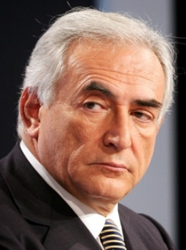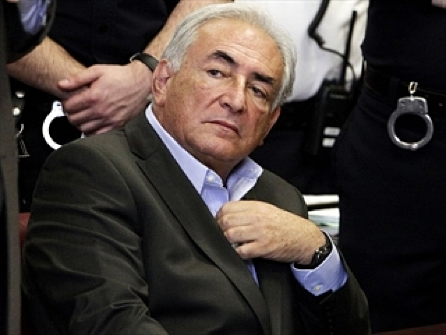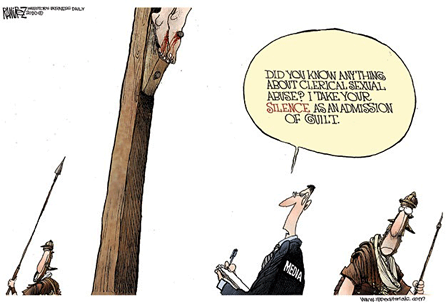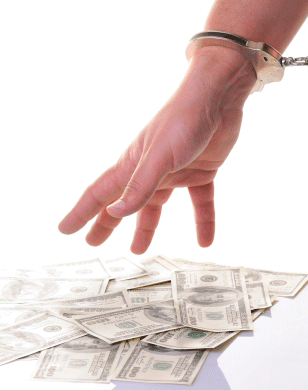Why the Sordid Case of Dominique Strauss-Kahn Matters to Catholics
 Sex charges against Dominique Strauss-Kahn led world news for weeks, then fell apart in a day due to something that rarely occurs when priests are accused.The notorious arrest of International Monetary Fund Chairman, Dominique Strauss-Kahn on charges of rape at a Manhattan hotel was a media event this summer. The media bias seemed to be the polar opposite of infamous sex charges against another European elite.In "The Whoopi Cushion" and "Roman Polanski, Father Marcial Maciel, and The Eye of the Beholder" - two 2010 posts on These Stone Walls - I wrote of reactions in the news and entertainment industries when Oscar-winning film director, Roman Polanski was arrested in Zurich, Switzerland. He had been on the lam from U.S. justice since 1977 after pleading guilty to drugging and sexually assaulting a 13-year-old girl. You may recall that Mr. Polanski was arrested when he traveled from his home in France to receive the Zurich Film Festival Lifetime Achievement Award.That fact alone contained more irony than I could bear, so I might be forgiven for writing of this again. Not long before Roman Polanski was nominated for the entertainment world's most prestigious award - to global applause from his industry peers - my bishop sent a letter to Rome describing his fear of assisting me with even the most basic means of support for preserving my civil rights or restoring my freedom. He wrote to a Vatican official that he risked a public outcry - presumably from groups like S.N.A.P. and V.O.T.F. - if he did anything to help me.Many in the entertainment world minimized Roman Polanski's offenses and dismissed them as being from too long ago for justice to be served today. Yet the charges against Roman Polanski and the claims against me came from the exact same time period.Many of the people who excused Roman Polanski condemned Catholic priests for claims that were much older, much less severe, and brought forward with far less evidence. At least one writer justified holding priests to a more stringent standard of justice: "Religion has more influence than the entertainment industry on American youth." I wondered what century that commentator was living in. That might be true for the Amish. It is far from true for the rest of America.The Roman Polanski case came to a close last year when the Swiss government announced its decision not to extradite Mr. Polanski to be sentenced in a U.S. court. On July 14, 2010 The Boston Globe devoted a paltry two inches of editorial space to a barely noticeable opinion that shielding Roman Polanski from justice was an affront to justice. The little squeak of an editorial stood in remarkable contrast to The Boston Globe's relentless, Pulitzer-endorsed flogging of the Catholic Church and priesthood that consumed much of its editorial space for the preceding eight years. Roman Polanski had nothing to fear from American justice if the Globe's wimpy little snippet was any measure of the news media's resolve to hold him accountable.TSK-TSK, DSK!Many Europeans, including some members Of the French government, were appalled at what they judged to be barbaric American treatment of Roman Polanski. So I could only imagine their reactions when Dominique Straus-Kahn, a front runner for the French presidency, was arrested on rape charges in June. His treatment seemed a lot more like what an accused Catholic priest would receive. He was paraded in shackles before cameras, hauled off to Riker's Island jail to await arraignment, subjected to almost celebratory media ridicule. Then, in a single July day, what appeared to be an open and shut case with clear and convincing evidence all fell apart.
Sex charges against Dominique Strauss-Kahn led world news for weeks, then fell apart in a day due to something that rarely occurs when priests are accused.The notorious arrest of International Monetary Fund Chairman, Dominique Strauss-Kahn on charges of rape at a Manhattan hotel was a media event this summer. The media bias seemed to be the polar opposite of infamous sex charges against another European elite.In "The Whoopi Cushion" and "Roman Polanski, Father Marcial Maciel, and The Eye of the Beholder" - two 2010 posts on These Stone Walls - I wrote of reactions in the news and entertainment industries when Oscar-winning film director, Roman Polanski was arrested in Zurich, Switzerland. He had been on the lam from U.S. justice since 1977 after pleading guilty to drugging and sexually assaulting a 13-year-old girl. You may recall that Mr. Polanski was arrested when he traveled from his home in France to receive the Zurich Film Festival Lifetime Achievement Award.That fact alone contained more irony than I could bear, so I might be forgiven for writing of this again. Not long before Roman Polanski was nominated for the entertainment world's most prestigious award - to global applause from his industry peers - my bishop sent a letter to Rome describing his fear of assisting me with even the most basic means of support for preserving my civil rights or restoring my freedom. He wrote to a Vatican official that he risked a public outcry - presumably from groups like S.N.A.P. and V.O.T.F. - if he did anything to help me.Many in the entertainment world minimized Roman Polanski's offenses and dismissed them as being from too long ago for justice to be served today. Yet the charges against Roman Polanski and the claims against me came from the exact same time period.Many of the people who excused Roman Polanski condemned Catholic priests for claims that were much older, much less severe, and brought forward with far less evidence. At least one writer justified holding priests to a more stringent standard of justice: "Religion has more influence than the entertainment industry on American youth." I wondered what century that commentator was living in. That might be true for the Amish. It is far from true for the rest of America.The Roman Polanski case came to a close last year when the Swiss government announced its decision not to extradite Mr. Polanski to be sentenced in a U.S. court. On July 14, 2010 The Boston Globe devoted a paltry two inches of editorial space to a barely noticeable opinion that shielding Roman Polanski from justice was an affront to justice. The little squeak of an editorial stood in remarkable contrast to The Boston Globe's relentless, Pulitzer-endorsed flogging of the Catholic Church and priesthood that consumed much of its editorial space for the preceding eight years. Roman Polanski had nothing to fear from American justice if the Globe's wimpy little snippet was any measure of the news media's resolve to hold him accountable.TSK-TSK, DSK!Many Europeans, including some members Of the French government, were appalled at what they judged to be barbaric American treatment of Roman Polanski. So I could only imagine their reactions when Dominique Straus-Kahn, a front runner for the French presidency, was arrested on rape charges in June. His treatment seemed a lot more like what an accused Catholic priest would receive. He was paraded in shackles before cameras, hauled off to Riker's Island jail to await arraignment, subjected to almost celebratory media ridicule. Then, in a single July day, what appeared to be an open and shut case with clear and convincing evidence all fell apart. Actually, what fell apart was the credibility of DSK's accuser. Writing for The Wall Street Journal Editorial Pages ("The DSK Lesson," July 5, 2011) columnist Bret Stephens chastised his own industry, the news media, for the sheer delight it took in the DSK charges. He wrote of how disappointed reporters were at news that the accuser had squandered her credibility on previous false claims and her recorded expectations of a financial windfall in the DSK case. Bret Stephens described the central problem with the news media's build-up of the DSK case, and what he wrote is something Catholics should pay attention to:
Actually, what fell apart was the credibility of DSK's accuser. Writing for The Wall Street Journal Editorial Pages ("The DSK Lesson," July 5, 2011) columnist Bret Stephens chastised his own industry, the news media, for the sheer delight it took in the DSK charges. He wrote of how disappointed reporters were at news that the accuser had squandered her credibility on previous false claims and her recorded expectations of a financial windfall in the DSK case. Bret Stephens described the central problem with the news media's build-up of the DSK case, and what he wrote is something Catholics should pay attention to:
"The media has too often been guilty of looking only for the evidence that fits a pre-existing story line. It doesn't help that in journalism you can usually find the story you're looking for . . .”
Such writing is exactly why I subscribe to The Wall Street Journal, and I believe it's why the Journal is the sole American newspaper to actually expand its readership over the last few years while other papers are dying. It takes courage to take on big stories like the rape case of Dominique Strauss-Kahn or sexual abuse by Catholic priests. But it takes even greater courage to police your own industry, and to challenge your peers when the story they want takes precedence over the truth.Does this mean that DSK is without sin? Not at all. But though all crimes are sins, not all sins are crimes. If they were, there would be no one free to run the prisons that we would all be in. Bret Stephens seemed to have no delusions about the true nature of DSK. I believe he used the word “sleaze” at least once in his editorial.If The Boston Globe had a Bret Stephens on its Spotlight Team, I believe the story of sexual abuse in the Catholic Church would have been told in a truthful, sobering light with far less glare. It is the glare of such stories that can blind writers – even blind an entire industry – to the other side of the story. A vivid example is Ryan MacDonald’s report, “Truth in Justice.” No one in the mainstream media would publish it because it just isn’t the story the media wants.As I wrote last year in “Catholic Scandal and the News Media," there is a problem with “spotlight” reporting like that to which The Boston Globe subjected the Catholic Church. It casts an intense light on the story the industry wants while leaving all the rest of the story in darkness.MY OWN MEDIA EVENTHere's a very personal example of what I mean. In "The High Cost of Father Marcial Maciel," I described a claim that followed me throughout the process of being accused, tried, and sentenced, and was widely reported in the news media. The claim was that I had created child pornography, but no evidence for the claim has ever surfaced, nor does any exist.Eight years after I was sent to prison, the 2002 national priesthood scandal erupted and cast my efforts for a rehearing back into the abyss. In early 2003, local news coverage sensationalized my bishop's decision to publish the entire personnel files of all priests accused whether they had ever been convicted of anything or not. My bishop agreed to this with no consultation with the priests affected, and with no regard for the confidentiality of file contents. All of it was published on the Bishop-Accountability site which takes no responsibility for whether any of its content is even true.As the material was being released and published, a local Associated Press reporter came to see me in prison at my request in early 2003. I told him I had a large amount of evidence that directly refuted what had been released publicly about me. The reporter agreed that in the light of what I showed him, the claims against me seemed more likely to be false than true. He then asked me about the claim of creating child pornography. I told him that the claim was baseless, and brought forward with no evidence or corroboration at all. He insisted that there must be evidence for such a claim to "stick," and be reported in the news media. I insisted there was no evidence at all.So before the AP reporter left, he told me that he was going to scour the entire case file and if he found that evidence, he was going to reveal it in a major news story. I then asked, "And if you discover there was no evidence at all?" He responded, "Then that should also be a news story." He then asked me to send him all the documentation I had to refute the claims and accounts he had written about me up to that point. He even gave me the address of a local attorney representing the Associated Press so that I could send the material confidentially. I sent some 500 pages documenting my side of the story.That was eight years ago. I never heard from that reporter again. When he discovered, as he obviously did, that there was in fact no evidence to support the child pornography claim, he just remained silent about it. When he received all the other documentation I sent him refuting other claims, he remained silent about that too. This reporter simply realized that the story he had been writing wasn't the truth. But the truth was not the story he wanted. So rather than write the truth, he just wrote nothing at all. And it wasn't just this one reporter or the Associated Press. A reporter from this state's largest newspaper also met with me in 2003 with a very similar result. Only, after reviewing my documentation, this reporter came back a second time to tell me that her editors "are so anti-Catholic, they won't let me write about a falsely accused priest." This is why I urge TSW readers to consider membership in the Catholic League for Religious and Civil Rights. It is often all that stands between the Church and a news media pursuing only the story it wants.THE OPPOSITE OF NIFONGA day after Bret Stephen's column was in The Wall Street Journal, writer Dorothy Rabinowitz - in an extraordinary example of investigative reporting - described the remarkable story of how the Dominique Strauss-Kahn case fell apart ("DSK and the District Attorney," July 6, 2011). Ms. Rabinowitz informed us that it was not DSK's defense team that uncovered and exposed the accuser's credibility problems. It was the prosecutor himself, a prosecutor with the integrity to conduct his public responsibility just as he was supposed to - in public, exposing the truth wherever the facts led him. So many Americans naively believe that it happens this way all the time. It doesn't!Manhattan District Attorney Cyrus Vance investigated both the accused and the accuser, and red flags about the accuser's credibility came quickly into view. It was exposed that DSK's accuser had lied about many things, both in her past and in some aspects of her current claims. It was also exposed that she came to see the case as a lottery ticket, a revelation that should have piqued the interest of Catholics everywhere for its familiar ring. For Dorothy Rabinowitz, the prosecutor's honest integrity was:
And it wasn't just this one reporter or the Associated Press. A reporter from this state's largest newspaper also met with me in 2003 with a very similar result. Only, after reviewing my documentation, this reporter came back a second time to tell me that her editors "are so anti-Catholic, they won't let me write about a falsely accused priest." This is why I urge TSW readers to consider membership in the Catholic League for Religious and Civil Rights. It is often all that stands between the Church and a news media pursuing only the story it wants.THE OPPOSITE OF NIFONGA day after Bret Stephen's column was in The Wall Street Journal, writer Dorothy Rabinowitz - in an extraordinary example of investigative reporting - described the remarkable story of how the Dominique Strauss-Kahn case fell apart ("DSK and the District Attorney," July 6, 2011). Ms. Rabinowitz informed us that it was not DSK's defense team that uncovered and exposed the accuser's credibility problems. It was the prosecutor himself, a prosecutor with the integrity to conduct his public responsibility just as he was supposed to - in public, exposing the truth wherever the facts led him. So many Americans naively believe that it happens this way all the time. It doesn't!Manhattan District Attorney Cyrus Vance investigated both the accused and the accuser, and red flags about the accuser's credibility came quickly into view. It was exposed that DSK's accuser had lied about many things, both in her past and in some aspects of her current claims. It was also exposed that she came to see the case as a lottery ticket, a revelation that should have piqued the interest of Catholics everywhere for its familiar ring. For Dorothy Rabinowitz, the prosecutor's honest integrity was:
"No small shock in a society accustomed to prosecutors whose instant response to the discovery of facts that undermine their case is to dig in all the more aggressively - recall the Duke University lacrosse case, or the notorious child abuse cases of the 1980s . . . "
I wrote of the Duke University prosecution, and prosecutor Mike Nifong's disgrace, recently in "Sex, Lies, and Videotape." However, I have a very personal awareness of Ms. Rabinowitz's dark revelations about out-of-control prosecutions in the “notorious child abuse cases of the 1980s.” Mine was one of those cases, and it's a story told well by Dorothy Rabinowitz herself in "A Priest's Story," and by Ryan MacDonald in his Special Report, "Truth in Justice."As I was preparing for trial in 1994, my adult accusers kept claiming to have been assaulted by me in a parish six years before I was ever even there. They were allowed to keep revising their claims throwing out years and dates, but they just couldn't get it right. Finally, rather than consider the possibility that they might be lying, the prosecutor and police detective provided them with a copy of my resume so they could pick a year that I was actually in their community. In the end, the adult brothers who first claimed to have been sexually abused by me at age ten had to settle on a revised claim that it all happened when they were fifteen to eighteen years old. The oldest of them - who first claimed he was raped by me at the age of twelve - discovered that he turned eighteen just two weeks after I was first assigned in his community. Credibility problems are no problem at all when prosecutors coach a lying witness until they get the results they want.LET'S PLAY "NAME THAT PRIEST"The whole sordid DSK affair reminded me of something that happened in prison in 2001, a full year before the national onslaught of sex abuse claims against Catholic priests.One day one of my fellow prisoners - Randy, a name which fit him well - was called to the prison visiting room for an unexpected visit. Upon his return, he was at my cell door, which was itself an unusual occurrence. Randy was one of those individuals who lived to scheme, and who approached every human interaction in terms of what might be in it for him. I was not at all in Randy's circle of friends in prison.Yet there he was. Thirty-something year-old Randy had an offer he thought I couldn't refuse. He had just been visited by his lawyer, whom he declined to name, and wanted to tell me of an "interesting opportunity" proposed by the lawyer. According to Randy, the lawyer asked if he is Catholic. Randy responded, "Well . . . sort of. I guess I used to be." The lawyer then asked if he "ever had a problem with a priest growing up." Randy - who caught onto opportunities quickly - saw where this was going. "I guess that depends," he told the lawyer who reportedly responded:
"Well, if you want to accuse a priest of something, I can have $50 grand in your account by the end of the year - a $100,000 settlement split fifty-fifty."
Randy was shaking with enthusiasm as he stood at my door. He said he told the lawyer that he lives in a cellblock with a Catholic priest who has been accused. "Even better," the lawyer reportedly said. "Tell him where you grew up and see if he can get you a name."So, let's get this straight. For a "finder's fee" I was to provide the name of some elderly or deceased priest who might have been present in Randy's childhood community. Randy described this scenario as "a win-win situation all around" - except perhaps for the poor priest he was planning to accuse. And it wasn’t just Randy. I wrote of several similar fraud attempts in my 2005 article for Catalyst, “Sex Abuse and Signs of Fraud.” I related the “Randy story” to a Catholic official who openly doubted there was any connection between money and the clergy sex abuse scandal. "If this is true," he wrote in reply, "it saddens me that some prisoners would come up with such a scam." I pointed out that the scam was not proposed by a prisoner. It was proposed by a contingency lawyer, a member of the bar who swore an oath to uphold justice. The Church official never responded to that fact. He just went on negotiating settlements for every claim involving a fellow priest that came across his desk.I guess I shouldn't leave the "Randy story" dangling lest you wonder how it ended. I sent Randy packing with a promise to personally expose him if he ever attempted such a scheme. He never gave me the name of the lawyer. "You never know," he said. "I might want to take him up on it some day." I knew two other prisoners who attempted the scam. Both received settlements even after I exposed it.Does this story send a chill down your spine? It should. Father Richard John Neuhaus once wrote to me that the very idea of priests and sexual abuse "is sleazy business." Indeed it is, but the driving forces behind its public face have been news reporters and contingency lawyers, and neither has made this business any less sleazy.Greed ranks right up there with lust among the Seven Deadly Sins.
I related the “Randy story” to a Catholic official who openly doubted there was any connection between money and the clergy sex abuse scandal. "If this is true," he wrote in reply, "it saddens me that some prisoners would come up with such a scam." I pointed out that the scam was not proposed by a prisoner. It was proposed by a contingency lawyer, a member of the bar who swore an oath to uphold justice. The Church official never responded to that fact. He just went on negotiating settlements for every claim involving a fellow priest that came across his desk.I guess I shouldn't leave the "Randy story" dangling lest you wonder how it ended. I sent Randy packing with a promise to personally expose him if he ever attempted such a scheme. He never gave me the name of the lawyer. "You never know," he said. "I might want to take him up on it some day." I knew two other prisoners who attempted the scam. Both received settlements even after I exposed it.Does this story send a chill down your spine? It should. Father Richard John Neuhaus once wrote to me that the very idea of priests and sexual abuse "is sleazy business." Indeed it is, but the driving forces behind its public face have been news reporters and contingency lawyers, and neither has made this business any less sleazy.Greed ranks right up there with lust among the Seven Deadly Sins.
